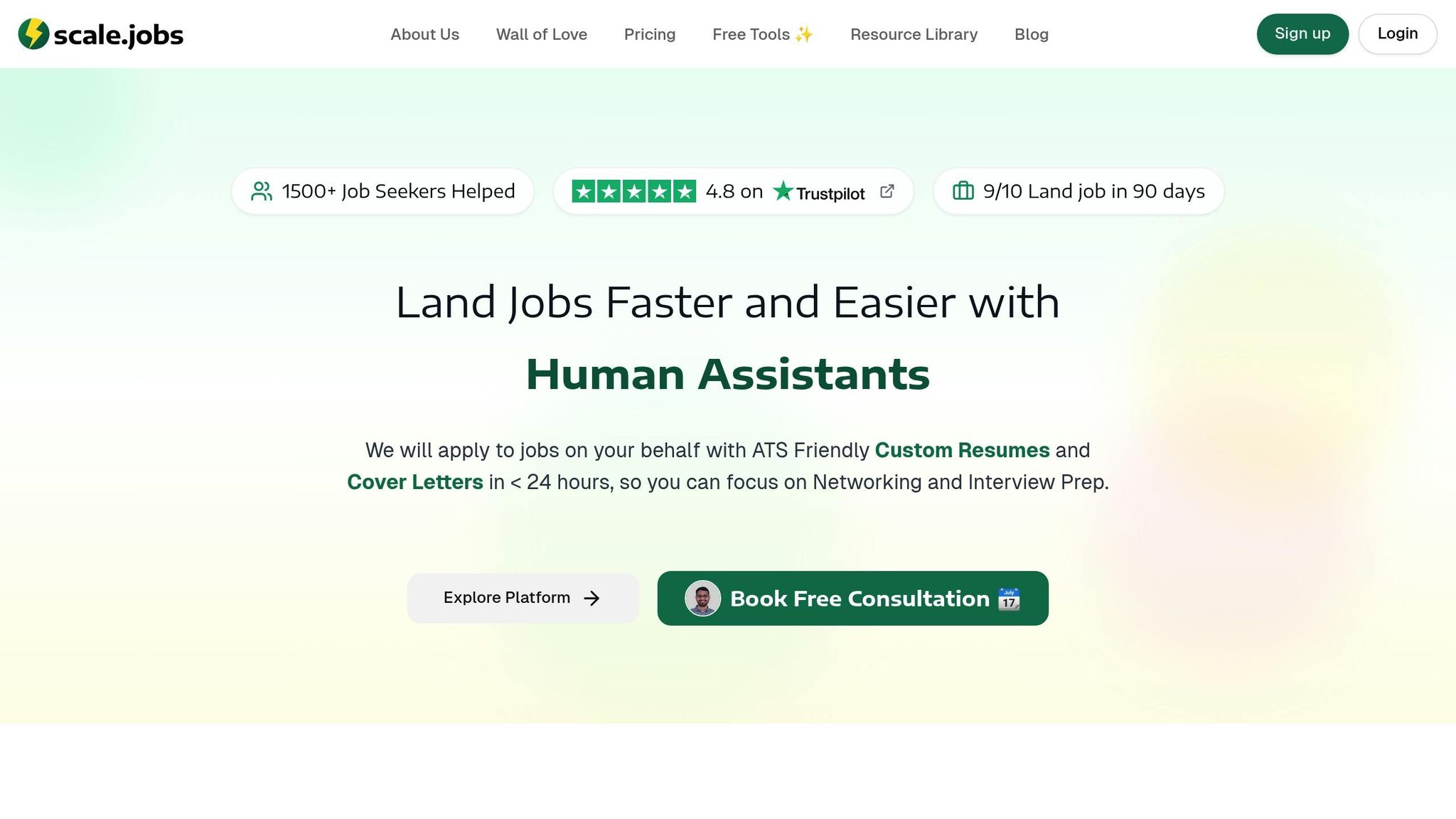Mentorship for Immigrant Job Seekers
Mentorship programs empower immigrant job seekers in the U.S. by offering tailored guidance, networking, and insights into local hiring practices.

Finding a job as an immigrant in the U.S. can be tough. Mentorship programs help bridge the gap by connecting immigrants with experienced professionals who offer tailored advice on resumes, interviews, and workplace expectations. These mentors help navigate challenges like limited networks, credential recognition, and understanding U.S. hiring norms.
Key takeaways:
- Challenges for immigrants: Lack of professional networks, unfamiliar hiring practices, and undervalued foreign credentials.
- Mentorship benefits: Personalized job search plans, industry insights, networking opportunities, and long-term career planning.
- Programs and tools: Free mentorship initiatives like Upwardly Global and TRIEC focus on guidance, while platforms like scale.jobs streamline applications with AI and human support.
Mentorship programs and job platforms complement each other, offering immigrants the tools and connections needed to succeed in the U.S. job market.
How Can Immigrants Connect With Mentors Through Employment Support Programs? - Immigrant Job Answers
Main Challenges for Immigrant Job Seekers
Recognizing these challenges is a crucial step in using mentorship to navigate them. Immigrant job seekers often encounter obstacles that can prolong their search and limit their opportunities, making targeted guidance even more essential.
Limited Professional Networks in the U.S.
Networking is a key part of job hunting in the United States. However, immigrants often lack the professional connections that U.S.-born candidates develop through education and early career experiences. This gap is significant - 50% of young immigrants depend on referrals[1], yet limited networks can leave them out of the loop on "hidden" job opportunities that are never publicly advertised. Without these connections, accessing such roles becomes an uphill battle.
Understanding U.S. Hiring Practices and Workplace Culture
The hiring process in the U.S. comes with its own set of unwritten rules and expectations. For example, interviews often require candidates to confidently highlight their achievements, a practice that may clash with cultural norms from other countries. As a result, even highly skilled immigrant candidates can come across as hesitant or unprepared, simply because their approach doesn't align with American workplace expectations.
Getting Credentials Recognized and Skills Transferred
For immigrants with advanced degrees and professional experience, credential recognition can be a major roadblock. Many arrive in the U.S. only to find that their qualifications don’t align with American standards. In regulated industries, this might mean completing additional coursework, passing exams, or gaining supervised experience. Even in less regulated fields, foreign credentials and work experience are often undervalued, forcing immigrants to take extra steps to prove their abilities. These hurdles highlight the importance of mentorship programs that can help bridge these gaps and provide tailored support.
How Mentorship Programs Support Immigrant Job Seekers
Mentorship programs play a crucial role in helping immigrants navigate the unique challenges of the U.S. job market. Beyond just offering advice on job hunting, these programs provide guidance on adapting to workplace norms, understanding industry expectations, and building personalized career strategies. By bridging gaps in knowledge and networks, mentors empower immigrants to translate their skills and experiences into success in a new professional landscape.
Custom Job Search Plans
One of the standout benefits of mentorship is the creation of tailored job search strategies. Mentors work closely with mentees to showcase their international experience in ways that resonate with U.S. employers. This starts with reformatting resumes and highlighting transferable skills.
For example, Upwardly Global's program focuses on adapting international resumes to meet U.S. standards. The goal is to emphasize achievements in ways that appeal to American hiring managers, ensuring that the mentee’s global expertise shines through. Mentors also guide mentees on how to streamline application strategies, making sure each submission effectively highlights their strengths.
The Immigrant Professionals Mentoring Program in Massachusetts takes things a step further by helping participants develop five-year career plans. These plans balance immediate job search tactics with long-term professional growth strategies, giving immigrants a clear roadmap for advancing their careers in the U.S. This kind of forward-thinking approach not only enhances job searches but also sets the foundation for sustained career development.
Industry Knowledge and Networking Access
Mentors also provide invaluable insights into specific industries, sharing knowledge that goes beyond what traditional job search resources can offer. From hiring trends to salary expectations and workplace culture, mentors help immigrants understand the nuances of their chosen fields.
Another major benefit is access to professional networks. Many mentors have deep connections in their industries and can introduce mentees to key contacts. These introductions often lead to informational interviews and opportunities that aren’t publicly advertised. For immigrants, who may lack established networks in the U.S., this kind of access can be a game-changer.
Programs like WES and JVS Toronto's group mentoring initiatives expand these networking opportunities even further by connecting immigrants with multiple professionals within their fields. This group approach not only broadens the mentee’s network but also exposes them to a variety of perspectives and advice.
Mentors often encourage mentees to attend industry events, workshops, and conferences. They provide tips on how to navigate these gatherings, make meaningful connections, and follow up effectively. This guidance helps mentees build confidence and maximize the value of these opportunities.
Skills Assessment and Career Planning
Mentorship programs also help immigrants assess and articulate their transferable skills. By analyzing international work experience and education, mentors identify which qualifications align with U.S. market standards and where additional development might be needed.
For instance, skills assessments can reveal gaps that may require certifications or training. A mentor might suggest that an internationally trained engineer pursue specific U.S. certifications or coursework to meet local standards. This targeted guidance ensures that mentees are well-prepared to compete in their fields.
Programs like Immigrants Rising's Mentorship Service offer virtual support that includes career planning tailored to undocumented students and professionals. These services address not only skill development but also the unique legal and practical challenges these individuals face.
Mentors also help mentees set realistic expectations and timelines for career progression. They guide immigrants on how to move from entry-level roles to positions that better match their experience and qualifications, creating a clear path for growth.
Mentorship Programs vs Job Search Platforms
When it comes to career support for immigrant job seekers, two main approaches often come into play: mentorship programs and job search platforms. Each offers unique benefits, and understanding how they operate can help immigrants choose the best option for navigating the U.S. job market. Here, we break down the key differences and explain why scale.jobs stands out as a valuable resource.
Mentorship vs Job Search Platforms: Key Differences
Mentorship programs are all about building relationships. They connect immigrants with experienced professionals who provide personalized career advice, guidance on adapting to workplace norms, and long-term professional development. These programs often involve one-on-one or group interactions, fostering a supportive environment for career growth.
On the flip side, job search platforms rely on technology to streamline the job application process. They offer tools like resume builders, application tracking, and AI-driven features designed to make the process faster and more efficient. While mentorship focuses on personal connections, platforms emphasize automation and systematic job search management.
The outcomes can differ significantly. Research shows that immigrants with mentors are 2.5 times more likely to secure full-time positions with benefits and growth opportunities. However, job search platforms can help immigrants apply to more jobs in less time, which is crucial in a competitive hiring landscape.
Comparing Programs and Platforms: Features, Costs, and Support
Here's a closer look at how some of the leading mentorship programs and job search platforms compare:
| Platform/Program | Type | Key Features | Cost | Unique Value |
|---|---|---|---|---|
| TRIEC Mentoring Partnership | Mentorship | One-on-one mentoring, networking, job search coaching | Free | Large mentor network across industries |
| YMCA Mentoring Program | Mentorship | Group/individual mentoring, job readiness, cultural support | Free | Community-focused with comprehensive support |
| WILL Immploy | Mentorship | Professional mentoring, employer links, skills workshops | Free | Strong ties with local employers |
| Starling Community Services | Mentorship | Career mentoring, workshops, networking | Free | Tailored support for refugees |
| scale.jobs | Job Platform | ATS resumes, AI cover letters, visa support, human assistants | Free to $1,099 flat fee | Combines AI and human expertise for immigrants |
Most mentorship programs are free, relying on volunteers and nonprofit funding. They typically involve a time commitment of about 1-2 hours per week over several weeks. In contrast, platforms like scale.jobs offer both free tools and premium services, providing flexibility for users with varying needs.
Why scale.jobs Stands Out for Immigrants

While mentorship programs excel at offering personal guidance and cultural adaptation, scale.jobs addresses the immediate, practical challenges immigrants face in their job search. Its blend of technology and human support creates unique advantages that go beyond what traditional mentorship or automated platforms can provide.
- Human-assisted application submissions: Unlike fully automated systems, scale.jobs uses trained virtual assistants to manually submit job applications. This approach avoids "bot flags" that can sometimes hinder automated submissions, ensuring applications are handled with care. This is especially helpful for immigrants dealing with complex visa requirements, as the assistants are knowledgeable about work authorization statuses like H1B, F1 CPT, TN, and O1.
- ATS-friendly resume optimization: Immigrants often struggle with translating international experience into formats that U.S. hiring systems recognize. scale.jobs uses AI to create tailored, ATS-compliant resumes for each application, helping candidates pass initial screening filters.
- Real-time WhatsApp updates: Immigrants juggling visa deadlines and job searches appreciate transparency. With live updates and timestamped proof-of-work, scale.jobs eliminates the uncertainty often associated with job applications.
- Flat-fee pricing: Instead of monthly subscriptions, scale.jobs offers a one-time fee for a set number of applications and services. This predictable pricing model appeals to immigrants managing tight budgets during career transitions.
Additionally, scale.jobs provides free tools that complement mentorship insights, such as an ATS resume checker, cover letter generator, salary predictor, and interview question predictor. These resources empower users to take control of their job search while applying the advice they receive from mentors.
For immigrants balancing multiple demands - visa applications, family responsibilities, and career planning - scale.jobs saves 20+ hours per week typically spent on job applications. This time can be redirected toward networking, interview preparation, and other areas where mentorship programs shine. Together, these features make scale.jobs a powerful ally for immigrant job seekers.
Finding Mentorship and Job Search Resources
How to Find and Join Mentorship Programs
Navigating unfamiliar hiring practices and building professional networks can be tough, especially for immigrant professionals. That’s where mentorship programs come into play. They provide the guidance and insider knowledge needed to tackle these challenges. Start by exploring local nonprofits, professional associations, and university alumni networks that cater to immigrant professionals.
University alumni networks are particularly helpful. Many universities have initiatives specifically designed for international alumni or immigrant professionals. Reach out to the career services departments of local universities to ask about mentorship or community outreach programs they may offer.
Most mentorship programs are simple to join. They usually require a short application and a commitment of just 1–2 hours per week over a few months (typically 3–6 months).
Another great option is corporate mentorship programs. Companies like Microsoft, IBM, and Accenture often run mentorship initiatives for underrepresented groups, including immigrants. Some of these programs even pair mentorship with job placement assistance, offering a dual benefit.
While mentorship provides personalized guidance, modern job search platforms can help with the technical side of finding employment.
Using Complete Job Search Platforms
In addition to mentorship, job search platforms can make the job hunt far less overwhelming. Platforms like scale.jobs simplify the process for immigrant professionals by combining technology and human support.
What sets scale.jobs apart is its all-in-one approach. Beyond just listing job openings or helping with resumes, it integrates AI tools, software, and human assistant services to address the unique challenges immigrants face - like handling complex visa requirements.
Here’s what scale.jobs offers:
- Flat-fee, visa-aware services: This means no surprise costs, and the platform is designed to navigate work authorization for visas like H1B, F1 CPT, TN, and O1.
- ATS-compliant resume optimization: The platform uses AI to tailor resumes to specific job applications, ensuring that international credentials and experience are presented in a way that U.S. employers value.
- Real-time updates: Through WhatsApp, users receive timestamped screenshots and updates, providing full transparency during the application process.
- Free tools: Features like an ATS resume checker and salary predictor help users understand how their resumes stack up and set realistic salary expectations.
The platform’s visa-aware human assistants ensure that applications meet work authorization requirements, giving employers accurate details about a candidate’s status. By handling these technicalities, scale.jobs frees up over 20 hours per week - time that can be better spent on networking and preparing for interviews.
With mentorship programs offering personal support and platforms like scale.jobs tackling logistical challenges, immigrant professionals can navigate the U.S. job market more effectively and with greater confidence.
Conclusion: How Mentorship Changes Immigrant Careers
Mentorship has the power to reshape immigrant careers by offering tailored guidance, helping with cultural adaptation, and opening doors to networks that might otherwise remain out of reach.
Its influence extends well beyond securing that first job. Programs like Upwardly Global's Career Coaching Program highlight how mentorship has been a game-changer for professionals like John and Taciana. They credit their mentors with boosting their confidence and helping them reestablish themselves in their fields. This kind of support not only leads to immediate job placements but also sets the stage for long-term career growth.
Similarly, organizations like StreetWise Partners have made strides in helping immigrant job seekers achieve financial independence and career advancement. Their 12-week mentoring cycles, with regular one-on-one meetings, address both the professional and cultural hurdles that many immigrants face. These programs provide sustained, hands-on support that makes a lasting difference.
Despite the fact that nearly 20% of the U.S. workforce is made up of internationally trained immigrants and refugees, around 2 million remain unemployed or underemployed. Mentorship programs have consistently shown that participants are far more likely to secure jobs aligned with their skills and experience. Beyond job placement, mentors offer access to social capital - connections and insights that can accelerate career advancement and break the cycle of underemployment.
Research underscores the importance of both social capital and professional skills in achieving career mobility. Mentors provide industry-specific advice, networking opportunities, and local knowledge that help immigrants adapt more quickly and succeed in their job searches.
Modern tools like scale.jobs complement mentorship by streamlining the technical side of job applications, making the process more efficient.
FAQs
How can mentorship programs help immigrants get their foreign credentials recognized in the U.S. job market?
Mentorship programs are a valuable resource for immigrants trying to get their foreign credentials recognized in the U.S. These initiatives offer tailored guidance, peer encouragement, and field-specific knowledge to help individuals navigate the often complex processes of credential evaluation and licensing.
A key feature of these programs is connecting immigrants with professionals who have successfully transitioned into similar careers. These mentors share practical advice on overcoming systemic hurdles and building meaningful professional networks. By creating these connections and offering focused support, mentorship programs empower immigrants to close knowledge gaps, build self-confidence, and work toward lasting career achievements, even when faced with language barriers or difficulties in credential recognition.
How can mentorship programs combined with platforms like scale.jobs benefit immigrant job seekers?
Combining mentorship programs with job search platforms like scale.jobs gives immigrant job seekers a strong edge in their career journey. Mentorship provides one-on-one guidance, helps navigate both professional and cultural challenges, and opens doors to valuable networking opportunities. This kind of support can be crucial for tackling obstacles like bias or adjusting to the nuances of the U.S. job market.
On the other hand, platforms like scale.jobs offer practical tools to simplify the job hunt. Features such as ATS-friendly resumes, customized cover letters, and personalized human assistance ensure that applications are polished, targeted, and submitted on time. Together, mentorship and scale.jobs create a comprehensive strategy, empowering immigrants to step into their careers with greater ease and confidence.
How can mentorship programs help immigrants overcome cultural challenges during their job search and workplace integration in the U.S.?
Mentorship programs offer crucial support for immigrant job seekers trying to navigate the complexities of the U.S. workplace. With the guidance of seasoned mentors, participants can better understand workplace norms, communication styles, and expectations, helping them gain confidence and feel more prepared for professional opportunities.
Beyond practical advice, these programs also encourage social and professional connections. By matching immigrants with mentors who are familiar with the hurdles of adapting to a new environment, these initiatives provide both cultural orientation and peer support. This partnership lays the groundwork for smoother job searches and long-term career development.




